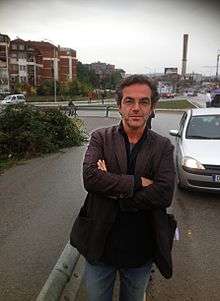Navid Kermani
| Navid Kermani | |
|---|---|
|
| |
| Born |
27 November 1967 Siegen, West Germany |
| Occupation | Novelist, essayist |
| Nationality | German |
| Spouse | Katajun Amirpur |
| Children | 2 |
Navid Kermani (Persian: نوید کرمانی; Persian pronunciation: [næviːd cɛrmɑniː]; born 27 November 1967 in Siegen, Germany) is a German writer and a self proclaimed Orientalist[1] scholar of Islam. He is the author of several novels as well as books and essays on Islam, the Middle East and Christian-Muslim dialogue.[2][3] He has won numerous prizes for his literary and academic work, including the Peace Prize of the German Booksellers' Association on 18 June 2015.[4]
Life
Navid Kermani was born the fourth son of Iranian parents in Siegen, West Germany. He began his writing career at age 15 as a local reporter for the Westfälische Rundschau.[5] As a student he published in German national newspapers; from 1996 to 2000 he was a regular contributor to the feuilleton section of Frankfurter Allgemeine Zeitung. He studied philosophy, Oriental studies and drama in Cologne, Cairo and Bonn. His doctoral thesis has been published in English translation as God Is Beautiful: The Aesthetic Experience of the Quran.[6]
He regularly publishes articles, literary reviews and travelogues, especially in Süddeutsche Zeitung, Die Zeit, and Neue Zürcher Zeitung.
Kermani holds German and Iranian citizenship. He is married to the Islam scholar Katajun Amirpur and has two children. He lives in Cologne
In the preface of his book Between Quran and Kafka: West-Eastern Affinities he acknowledges that he is an Orientalist and his world view has been shaped by his childhood interactions living in a German society.[7]
Bibliography

- Offenbarung als Kommunikation: Das Konzept wahy in Nasr Hamid Abu Zaids Mafhum an-nass, Frankfurt et al. 1996 (Peter Lang).
- Gott ist schön: Das ästhetische Erleben des Koran, Munich 1999: C. H. Beck.
- Nasr Hamid Abu Zaid: Ein Leben mit dem Islam, Freiburg 1999: Herder.
- Iran: Die Revolution der Kinder, Munich 2000: C. H. Beck.
- Dynamit des Geistes: Martyrium, Islam und Nihilismus, Göttingen 2002: Wallstein.
- Das Buch der von Neil Young Getöteten, Zurich 2002: Ammann: Cologne 2004: Kiepenheuer.
- Schöner Neuer Orient: Berichte von Städten und Kriegen, Munich 2003: C. H. Beck; Munich 2007: dtv.
- Toleranz: Drei Lesarten zu Lessings Märchen vom Ring im Jahre 2003 (with Angelika Overath and Robert Schindel), Göttingen 2003: Wallstein.
- Vierzig Leben, Zurich 2004: Ammann.
- Du Sollst, Zurich 2005: Ammann.
- Der Schrecken Gottes Munich 2005: C. H. Beck.
- Strategie der Eskalation: Der Nahe Osten und die Politik des Westens, Göttingen 2005: Wallstein.
- Nach Europa, Zurich 2006: Ammann.
- Ayda, Bär und Hase, Vienna 2006: Picus.
- Mehdi Bazargan, Der Koran und die Christen, edited by Navid Kermani, Munich 2006: C. H. Beck.
- Kurzmitteilung, Zurich 2007: Ammann.
- Wer ist Wir? Deutschland und seine Muslime, Munich 2009: C. H. Beck.
- Ausnahmezustände: Reisen in eine beunruhigte Welt, Munich 2013: C. H. Beck.
- Zwischen Koran und Kafka: West-östliche Erkundungen, Munich 2014: C. H. Beck.
- Ungläubiges Staunen: Über das Christentum, Munich 2015: C. H. Beck.
In English translation
- The Terror of God, Cambridge 2011: Polity.
- God Is Beautiful: The Aesthetic Experience of the Quran, Cambridge 2014: Polity.
- Between Quran and Kafka: West-Eastern Inquiries, Cambridge 2016: Polity.
Awards and distinctions
- 2009: Hessian Cultural Prize[8]
- 2011: Buber–Rosenzweig Medal
- 2011: Hannah Arendt Prize[9]
- 2012: Kleist Prize[10]
- 2012: Cicero Prize for public speaking[11]
- 2014: Joseph Breitbach Prize[12]
- 2015: Member of the North Rhine-Westphalian Academy of Sciences, Humanities and the Arts
- 2015: Peace Prize of the German Booksellers' Association[13]
- 2015: Jan Michalski Prize for Literature finalist for Zwischen Koran und Kafka: West-östliche Erkundungen[14]
Hessian Cultural Prize controversy
In 2009, the German state of Hesse decided to award its 45,000 euro Hessian Cultural Prize in July 2009 jointly to a Jew, a Muslim, a Catholic and a Lutheran to honour those involved in interfaith dialogue. There was controversy over Kermani's nomination as one of the three winners because of an essay in which Kermani had written about his feelings on seeing a painting of the crucifixion by the seventeenth-century Italian painter Guido Reni. The issue was ultimately resolved, and Cardinal Karl Lehmann, Peter Steinacker, Kermani, and Salomon Korn jointly received the prize on 26 November 2009.[15][16] Kermani donated his share of the award to a Christian priest.[17]
References
- ↑ Between Quran and Kafka: West-Eastern Affinities Navid Kermani ISBN: 978-1-5095-0033-8, Preface, page 9
- ↑ "Navid Kermani to assume post as guest lecturer in poetry".
- ↑ Lebenslauf
- ↑ Navid Kermani erhält Friedenspreis 2015
- ↑ Goethe-Institut: Navid Kermani.Schriftsteller, Orientalist und Kölner Weltbürger
- ↑ Navid Kermani: God Is Beautiful: The Aesthetic Experience of the Quran at Google Books
- ↑ Between Quran and Kafka: West-Eastern Affinities Navid Kermani ISBN: 978-1-5095-0033-8
- ↑ Link list on the proposed retraction of Navid Kermani's Hessian Cultural Prize on the City of Münster's website, last accessed 23 July 2014.
- ↑ Award announced in July, 2011; presented in December, 2011.
- ↑ Navid Kermani erhält Kleist-Preis 2012. In: Saarbrücker Zeitung, 21 August 2012, p. B4.
- ↑ Schriftsteller Kermani wird mit Cicero-Rednerpreis ausgezeichnet. In: Westdeutsche Allgemeine Zeitung, 24 September 2012.
- ↑ Navid Kermani erhält Breitbach-Literaturpreis. In: Der Standard, 20 May 2014.
- ↑ http://www.friedenspreis-des-deutschen-buchhandels.de/445651/?mid=970671
- ↑ "2015 Edition". Jan Michalski Prize for Literature. Retrieved November 27, 2015.
- ↑ The Iranian 05/17/2009
- ↑ (German) Hessen Cultural Prize: Koch apologizes to Kermani
- ↑ Priest bridges religious divide by funding Germany's biggest mosque